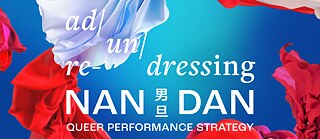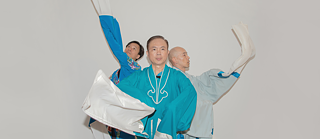ad/un/re-dressing Nán Dàn 3 & 7 February 2024
ABOUT
AD/UN/RE-DRESSING NÁN DÀN is an artistic research that attempts to expand the notion of contemporary male subjectivity, by looking at Nán Dàn (男旦) through a queer lens. Nán Dàn is a traditional male-to-female cross-dressing performance form in the Xì Qǔ (戏曲), or more commonly known by its European misnomer: Chinese opera. Its origin can be traced back to the 5th century B.C. and it reached its peak in the early 20th century. Today however, it is a dying art form.Ming Poon and Lee Mun Wai initiated the research in Berlin as a sub-strand of another research project S.O.A.R. Queen (Study of a Rice Queen)*, which looks at the potential of Nán Dàn as a tool to decolonise white queerness. In AD/UN/RE-DRESSING NÁN DÀN, the artists turn their focus to heteronormative masculinity and ask: how can Nán Dàn be transformed into a queer performance tool to re-evaluate our male identity and challenge the limit of masculinity?
Situating the research in Singapore has also opened up another line of enquiry: the challenges of cultural preservation. As Nán Dàn is slowly dying out today, the artists seek to address the pressing question of its preservation. In this research, Ming Poon and Lee Mun Wai want to look beyond the “nostalgic” approach to cultural preservation, by drawing inspiration from queer and decolonial strategies. How can we negotiate with Nán Dàn, so that it can become relevant to the current socio-cultural context that we live in? The artists invite the only and last remaining Nán Dàn artist in Singapore, Aw Yeong Peng Mun, to join them in the research.
* S.O.A.R. Queen (Study of a Rice Queen) is a 2-year research project by Ming Poon, supported by Berlin Artistic Research Grant Programme (2022-23).
PUBLIC EVENTS
3 & 7 FEB
Workshop with Aw Yeong Peng Mun3 February, Saturday, 1:00 to 2:30 pm
In this workshop, you will get a rare opportunity to learn about the basic techniques of Nán Dàn, gently guided by Nán Dàn artist, Aw Yeong Peng Mun.
- No prior experience required
- Wear loose light clothing and sneakers
- Limited to 10 participants
Artist talk with Aw Yeong Peng Mun
3 February, Saturday, 2:45 to 4:00 pm
You’re invited to join this artist talk with Aw Yeong Peng Mun who will share his personal experience as the only and last remaining Nán Dàn artist in Singapore, as well as his thoughts on the challenges of preserving this traditional art form.
- Limited to 30 participants
Open Studio Presentation
7 February, Wednesday, 7:00 to 8:30 pm
Set within an open studio format, the artists Ming Poon and Lee Mun Wai, will present what they have worked on during their occupancy of 136 Goethe Lab. The event will be followed by a public discussion.
- Limited to 30 participants
THE ARTISTS
Ming Poon works with applied choreography, using it as a tool to interrogate, disrupt and re-organise the social and political relationality of the body in time and space. In particular, he is interested in the potential within the body of the weak/peripheral to resist and disrupt hegemonic structures, using choreographic strategies that involve decolonisation, vulnerability, care, queerness and failure. For him, movement refers to the body’s ability to move, take action, and have agency to create change. He sees his works as choreographic interventions and social experiments, where the public determines the outcome of their experience. His practice is inspired by Buddhist concept of interdependency and care, Judith Butler’s resistance in vulnerability, Jack Halberstam’s queer art of failure, Augusto Boal’s theatre of the oppressed and Nicolas Bourriaud’s micro-utopias.Lee Mun Wai is a dancer / choreographer who works independently between his two bases – Berlin and Singapore. In July 2021, he completed his Masters Choreography and Performance at the Institute for Applied Theatre Studies in Giessen, Germany. (Institut für Angewandte Theaterwissenschaft). His current dance and choreographic practice insists on a relational porosity between himself and his environment. He employs open-ended strategies to create ways of moving and performing that stay sensitive in their reading of their environment. Through this practice, dancing and choreographing become acts of relation and communication in which the politics between his dancing body, other bodies and the environment are negotiated.
Aw Yeong Peng Mun is the only male Huadan in Singapore who has been given recognition by Madam Hong Xian Nu, the celebrated Cantonese opera master from China, for emulating and incorporating her unique style of singing into his own. He has also come to be associated with the classic repertoire of Hong Xian-Nu, while maintaining his own unique rendering of the Huadan role. Peng Mun specialises in the Qingyi role (virtuous and chaste woman), which emphasises singing technique and graceful movements. His most memorable roles are those of tragic female protagonists such as Jiu Kwei-Ying in "Thrashing the Sea God" and Wang Bao-Chuan in "Peng Kwei bids his wife farewell”, among others. He has performed in China, Japan, Malaysia, Egypt, London, Russia & Canada on various occasions.
The Space
136 GOETHE LAB is a new project space at the Goethe-Institut Singapore. Housed in the former library and reading room, the space is intended as a response to the need for physical spaces for the arts, and an ongoing conversation with the public and arts community in Singapore.AD/UN/RE-DRESSING NÁN DÀN is supported as part of the open call for 136 GOETHE LAB, which invited applicants to activate the space with a group proposal.

